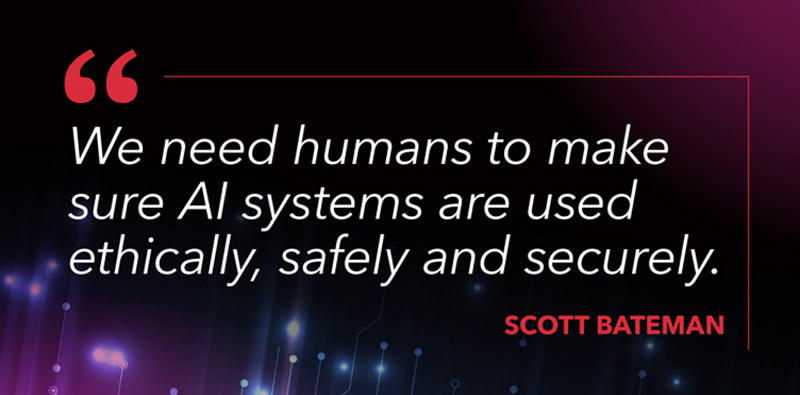Why computer science degrees and human oversight matter more than ever in the age of AI (Part 1)
Author: Hilary Creamer Robinson
Posted on Jul 7, 2025
Category: UNB Fredericton

Artificial intelligence (AI) is evolving fast, but that doesn’t mean humans should be left behind. According to UNB’s Dr. Scott Bateman, they’re needed now more than ever.
Dr. Scott Bateman, a leading researcher at the University of New Brunswick’s (UNB) Research Institute for Data Science and Artificial Intelligence (RIDSAI), SPECTRAL Spatial Computing Research Centre and Human-Computer Interaction Lab argues that human creativity, problem-solving and decision-making are more crucial than ever in a world driven by AI.
In this two-part Q&A series, Bateman busts myths about AI and computer science and shares how students and researchers at UNB are shaping the future of human-AI collaboration.
Myth #1: AI will replace human creativity.
UNB: With each passing day, AI gets better at writing code, creating art and solving problems. Is human creativity becoming obsolete?
Bateman: When we think about AI these days, most often we are thinking about Large-Language Models (LLMs).
LLMs are fantastic because they use a huge amount of data that already exists. They can find connections in that data and summarize it in a way that is easy to understand. But they are not creative in the same way people are.
They rely on data that they have already seen to make a guess at what sounds like something we want to hear; they are good at mimicking what people have already created.
This can seem like creativity, but it’s a shallow type of creativity because it doesn’t invent.
People will always have the innate ability for deeper creativity, inventing ideas and thoughts that no one has had before. Human emotion and our understanding of larger contexts and constraints allow for this kind of innovative thinking—and also help us understand whether a creative idea is one that others will be receptive to.
Solving society’s biggest problems will require deep creativity.
Myth #2: AI will become more emotionally intelligent than people.
UNB: You talked about AI being a good mimic. What about its ability to mirror human empathy and compassion?
Bateman: For some types of tasks, AI can do a reasonable job. For example, we have seen a rise in chatbots handling communications with customers, either via chat or sometimes voice. This works most of the time because people largely have the same questions about products and services that can be well-defined and tested beforehand.
But sometimes, chatbots fail.
A Canadian airline recently had a chatbot give a passenger incorrect information about bereavement fares. The airline had to honour the chatbot’s mistake in a situation where human sensitivity and compassion would have been appreciated by the customer.
I like this simple example because it reinforces the idea that those who take advantage of AI must be held accountable.
It also suggests that while AI can streamline some tasks, we have to use it carefully. To maintain our humanity, human oversight is required.
Myth #3: AI will take computer science jobs.
UNB: There’s a lot of fear that AI is making human workers obsolete. What are your thoughts on this?
Bateman: I believe that humans will never be obsolete in the workforce.
We need human oversight to identify when things are wrong or not working. We need humans to make sure that AI systems are used ethically, safely and securely. We will always need humans for deep, creative insights.
One possibility that we have to guard against is the amount of work people are responsible for.
We have seen a steady increase in workloads with the introduction of transformative technologies (calculators, personal computers, the Internet and smartphones).
This is referred to as the “productivity paradox,” where new capabilities lead to much higher expectations.
To build on the airline example, say a customer service representative who was once responsible for handling dozens of customers on the phone over the course of the day now must provide oversight on hundreds of cases that were filtered through a chatbot.
This creates an increase in expectation, and is another reason why human oversight and management is and will remain crucial. Because while humans might not be able to get through a task list as quickly as AI, the quality of work can suffer, and critical mistakes can be made.
Reports similar to this one have been well documented and ideally should be avoided. Many of these reports suggest that people across a wide range of fields already feel overburdened.
UNB: How is UNB preparing students to thrive in an AI-driven job market?
Bateman: There are a few ways UNB is doing a good job of preparing students.
First, we are doing what we have always done: providing world-class education in computer science that ensures students build a fundamental knowledge base. This is so important because when AI provides a bad solution or when real creativity is required, our graduates are prepared to tackle challenges and think critically and innovatively.
Second, we are always adapting our courses by incorporating new practices and the latest content. This includes adjusting how we assess students to make sure they are not becoming overly reliant on AI, while still providing opportunities for appropriate AI uses that support learning and reinforce industry best practices.
Third, we are creating new course offerings that cover the latest developments in AI, machine learning, cybersecurity, software engineering, systems architecture, human-computer interaction, social issues and ethics.
These topics go far beyond coding. They help prepare computer scientists to address bigger and broader topics and provide a platform for deep understanding and creativity—not just related to building computer systems, but how to make sure they work in real-world situations.
Image credit: Brad Hudson
